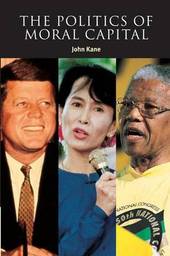
|
The Politics of Moral Capital
Paperback / softback
Main Details
| Title |
The Politics of Moral Capital
|
| Authors and Contributors |
By (author) John Kane
|
| Series | Contemporary Political Theory |
|---|
| Physical Properties |
| Format:Paperback / softback | | Pages:288 | | Dimensions(mm): Height 229,Width 152 |
|
| Category/Genre | Social and political philosophy |
|---|
| ISBN/Barcode |
9780521663571
|
| Classifications | Dewey:172 |
|---|
| Audience | | Professional & Vocational | | Tertiary Education (US: College) | |
|---|
| Illustrations |
Worked examples or Exercises
|
|
Publishing Details |
| Publisher |
Cambridge University Press
|
| Imprint |
Cambridge University Press
|
| Publication Date |
23 August 2001 |
| Publication Country |
United Kingdom
|
Description
It is often said that politics is an amoral realm of power and interest in which moral judgment is irrelevant. In this book, by contrast, John Kane argues that people's positive moral judgments of political actors and institutions provide leaders with an important resource, which he christens 'moral capital'. Negative judgements cause a loss of moral capital which jeopardizes legitimacy and political survival. Studies of several historical and contemporary leaders - Lincoln, de Gaulle, Mandela, Aung San Suu Kyi - illustrate the significance of moral capital for political legitimation, mobilizing support, and the creation of strategic opportunities. In the book's final section, Kane applies his arguments to the American presidency from Kennedy to Clinton. He argues that a moral crisis has afflicted the nation at its mythical heart and has been refracted through and enacted within its central institutions, eroding the moral capital of government and people and undermining the nation's morale.
Reviews'The Politics of Moral Capital is one of the few books to investigate how and why morality matters to politics and, less broadly, how popular judgments about moral leadership facilitate or impede political action. Kane's thoughtful study examines each of these questions in depth and will b e of interest to political scientists, historians, and anyone interested in studying nineteenth- and twentieth-century political leadership.' Asian Journal of Politics '... this book stands as a refreshing effort to come to terms with the inescapably moral character of political life. It is also an important contribution to the academic study of statesmanship.' Journal of Democracy
|